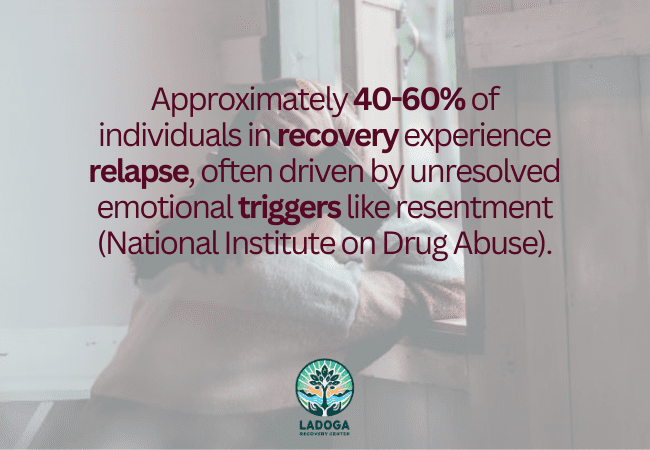Recovery from addiction is a journey that involves healing not only the body but also the mind and emotions. One significant emotional hurdle that many people encounter during recovery is resentment. Resentment—whether toward others, oneself, or life circumstances—can become a persistent barrier to progress if not addressed. It can fuel negative emotions, damage relationships, and even increase the risk of relapse.
By learning to identify and manage resentment, you can create space for emotional growth, strengthen relationships, and maintain long-term sobriety. This guide offers six detailed tips for dealing with resentment in recovery, as well as how professional Substance Abuse Treatment, Detox Treatment, Residential Treatment, and Inpatient Treatment programs can help you navigate these challenges.
Why Resentment Is Dangerous in Recovery
Resentment often manifests as unresolved anger, frustration, or bitterness, which can have serious consequences in recovery:
- Emotional Overload: Resentment can lead to feelings of anger, depression, or guilt, making it harder to maintain emotional stability.
- Increased Risk of Relapse: Unresolved resentment can trigger cravings or serve as a justification to return to substance use.
- Damaged Relationships: Resentment can strain relationships with family, friends, and support networks, leaving you isolated.
- Blocked Personal Growth: Holding onto resentment can prevent you from fully engaging in your recovery journey and experiencing the benefits of emotional healing.
Understanding these risks is the first step toward addressing and overcoming resentment.
6 Tips for Dealing with Resentment in Recovery
1. Identify the Root of Resentment
Resentment often stems from unresolved issues, unmet expectations, or past experiences. Taking the time to identify the source of your resentment is crucial for addressing it.
How to Start:
- Reflect on your feelings: Who or what is the focus of your resentment?
- Journal about specific incidents or emotions tied to these feelings.
- Consider whether your resentment is linked to personal guilt, external circumstances, or unresolved conflicts.
Example: If you feel resentment toward a loved one for not supporting you during your addiction, recognize how this feeling impacts your recovery and relationships.
2. Practice Forgiveness
Forgiveness is not about excusing harmful behavior but rather releasing the emotional burden of anger and bitterness for your own well-being.
Steps to Forgiveness:
- Start with self-forgiveness: Accept that past mistakes do not define your future.
- Work toward forgiving others, even if they don’t apologize.
- Use affirmations like, “I release this resentment for my peace.”
- Understand that forgiveness is a process and may take time.
Professional Help: Therapists in Residential Treatment and Inpatient Treatment programs often guide individuals through forgiveness exercises to promote emotional healing.
3. Seek Professional Support
Resentment can be deeply ingrained, making professional guidance essential for overcoming it.
Treatment Options:
- Detox Treatment: Clears your body and mind of substances, allowing you to focus on emotional healing.
- Residential Treatment: Provides a structured environment where individual and group therapy address underlying emotions like resentment.
- Inpatient Treatment: Offers intensive one-on-one counseling to explore the roots of resentment and develop coping strategies.
Benefits of Professional Support:
- Access to experienced therapists who specialize in addiction recovery.
- Safe spaces to share feelings and gain perspective.
- Holistic therapies like mindfulness, yoga, and art therapy to process emotions.
4. Practice Gratitude
Gratitude is one of the most effective tools for combating resentment. By focusing on the positive aspects of your life, you can shift your perspective and diminish the power of negative emotions.
Ways to Practice Gratitude:
- Start a gratitude journal: Write down three things you’re grateful for every day.
- Reflect on your recovery progress and the support you’ve received.
- Use mindfulness techniques to appreciate small, positive moments throughout your day.
Impact: Gratitude helps reframe your thoughts, reducing the intensity of resentment and fostering emotional resilience.
5. Build Healthy Relationships
Resentment often thrives in isolation or strained relationships. Rebuilding trust and fostering supportive connections can help you move past these negative emotions.
Steps to Build Healthy Relationships:
- Communicate openly and honestly with loved ones.
- Participate in group therapy or 12-step meetings to connect with others who understand your experiences.
- Set boundaries with toxic individuals to protect your emotional well-being.
Tip: Relationships require effort and vulnerability. Take small steps to repair damaged connections, and celebrate progress as trust is rebuilt.
6. Focus on Personal Growth
Shifting your focus from resentment to personal development can empower you to leave past grievances behind and build a brighter future.
How to Promote Personal Growth:
- Set recovery goals, such as improving your physical health, learning a new skill, or volunteering.
- Engage in activities that bring you joy, like hobbies or creative pursuits.
- Celebrate milestones in your recovery, no matter how small.
Why It Works: Personal growth fosters a sense of accomplishment and purpose, helping to reduce the emotional hold of resentment.
The Link Between Resentment and Relapse
Resentment is one of the most dangerous emotions in recovery, often referred to as a “relapse trigger in disguise.” Left unchecked, it can create a cycle of negative emotions, stress, and cravings that threaten sobriety. Understanding the connection between resentment and relapse is crucial for maintaining progress in recovery.
1. Emotional Overload
Resentment fuels feelings of anger, frustration, and bitterness, which can become overwhelming. These emotions can lead to impulsive behaviors, including substance use, as a way to escape or numb the pain.
2. Amplified Cravings
Negative emotions, such as resentment, are closely tied to increased cravings for drugs or alcohol. When individuals dwell on past wrongs or injustices, they may turn to substances as a coping mechanism.
3. Isolation and Relationship Strain
Resentment can push individuals away from their support networks, isolating them from loved ones or recovery groups. Without these vital connections, it becomes easier to rationalize relapse.
4. Justifying Substance Use
Unresolved resentment can lead to thoughts like, “I deserve to feel better” or “It’s their fault I’m in this situation.” This mindset can make relapse seem justifiable.
How to Prevent Relapse from Resentment:
- Regularly address unresolved feelings through therapy or journaling.
- Recognize and challenge thoughts that fuel resentment.
- Seek support from counselors or peers when resentment arises.

Why Addressing Resentment is Crucial for Emotional Healing
Resentment is a heavy burden that can prevent individuals from fully embracing their recovery journey. Addressing it head-on is essential for emotional growth, mental clarity, and long-term sobriety.
1. Fosters Self-Awareness
Resentment often stems from unresolved guilt, unmet expectations, or unresolved conflicts. By exploring these feelings, individuals gain deeper insights into their emotional triggers and learn to manage them effectively.
2. Promotes Forgiveness and Release
Holding onto resentment ties individuals to past pain and prevents them from moving forward. Addressing these feelings helps release the emotional hold of resentment, allowing for forgiveness—whether directed at oneself or others.
3. Supports Emotional Balance
Unresolved resentment creates emotional instability, making it harder to maintain focus and positivity in recovery. Confronting and resolving these feelings fosters emotional equilibrium, which is vital for staying sober.
4. Strengthens Relationships
Resentment often damages relationships, leading to estrangement or hostility. Addressing these issues can help repair and rebuild connections, creating a stronger support network.
5. Encourages Personal Growth
Letting go of resentment opens the door to personal development. It allows individuals to redirect their energy toward self-improvement and meaningful goals, rather than dwelling on negativity.
Tips for Rebuilding Trust and Strengthening Relationships
Recovery often involves mending relationships that were strained or broken during active addiction. Rebuilding trust and fostering healthy connections is a vital step toward emotional stability and long-term sobriety.
1. Communicate Openly and Honestly
- Be transparent about your recovery process and goals.
- Acknowledge past mistakes and take responsibility for your actions.
- Practice active listening to understand others’ perspectives without judgment.
2. Apologize and Make Amends
- Offer sincere apologies for any harm caused during your addiction.
- Focus on making amends through consistent actions, not just words.
- Be patient, as rebuilding trust takes time and effort.
3. Set and Respect Boundaries
- Establish healthy boundaries to protect your emotional well-being.
- Respect others’ boundaries and understand their need for time or space.
- Use boundaries as a way to foster mutual respect and understanding.
4. Engage in Shared Activities
- Reconnect with loved ones by participating in activities you both enjoy, such as walks, hobbies, or family outings.
- Shared experiences can help rebuild trust and strengthen emotional bonds.
5. Seek Support Together
- Encourage loved ones to join family therapy sessions or support groups to better understand the recovery process.
- Use these sessions to address unresolved issues in a safe, guided environment.
6. Show Consistency and Reliability
- Follow through on promises and commitments to demonstrate your reliability.
- Small actions, like showing up on time or keeping your word, help rebuild trust over time.
7. Express Gratitude and Appreciation
- Regularly express gratitude for the support and love of those around you.
- Acknowledge their role in your recovery journey to strengthen connections.
How Professional Treatment Can Help with Resentment
Professional addiction treatment programs provide a safe, supportive environment to address and resolve resentment.
Key Services:
- Individual Counseling: Work with a therapist to explore the root causes of resentment and develop effective coping strategies.
- Group Therapy: Share experiences and learn from peers who are navigating similar challenges.
- Holistic Therapies: Practices like meditation, yoga, and art therapy help process and release negative emotions.
- Aftercare Support: Continuing care programs provide ongoing resources and community connections to maintain progress.
At an Addiction Treatment Center in Indiana, programs like Detox Treatment, Residential Treatment, and Inpatient Treatment offer comprehensive support for managing emotions like resentment, ensuring they don’t derail your recovery.
Conclusion
Resentment is a natural but challenging emotion that can hinder your recovery if left unresolved. By identifying its source, practicing forgiveness, seeking professional help, cultivating gratitude, strengthening relationships, and focusing on personal growth, you can overcome resentment and create space for healing and positivity.
If resentment or other emotional barriers are affecting your recovery, reach out to an Addiction Treatment Center in Indiana. Professional programs can provide the tools and support you need to address these challenges and achieve long-term sobriety. Take the first step towards healing by reaching out today at (866) 609-8454.
FAQ on Managing Resentment in Recovery
Why is resentment a common issue during recovery?
Resentment often stems from unresolved conflicts, past trauma, or guilt. It’s common in recovery as individuals confront these emotions without the numbing effects of substances.
How does resentment affect recovery?
Resentment can lead to emotional instability, strain relationships, and increase the risk of relapse by triggering stress and cravings.
Can professional treatment help with resentment?
Yes, programs like Detox Treatment, Residential Treatment, and Inpatient Treatment offer therapy and holistic approaches to address resentment and its underlying causes.
How can I start letting go of resentment?
Start by identifying its root cause, practicing forgiveness, focusing on gratitude, and seeking professional support if needed.
Why is rebuilding trust important in recovery?
Rebuilding trust strengthens relationships, reduces isolation, and provides a supportive foundation for long-term sobriety.

